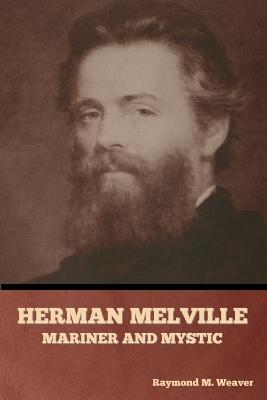Herman Melville, Mariner and Mystic

Herman Melville, Mariner and Mystic
Raymond Melbourne Weaver (1888 - April 4, 1948) was a professor of English and comparative literature at Columbia University in 1916-1948, and a literary scholar best known for publishing Herman Melville: Mariner and Mystic, the first full biography of American author Herman Melville (1819-1891) in 1921 and editing Melville's works. Weaver's scholarly credentials, training, and persuasiveness were important in launching the "Melville Revival" of the 1920s that brought Melville from obscurity to wide recognition.
Weaver was an influential teacher. He published a novel, wrote introductions for editions of American fiction, book reviews, and literary essays, but never published another scholarly book after his book on Melville.
Herman Melville: Mariner and Mystic (1921) was the first full-length study of Melville. Weaver presents Melville as a disappointed and disillusioned genius who rebelled against social convention and paid the price: "His whole history is the record of an attempt to escape from an inexorable and intolerable world of reality." Weaver praises Melville for establishing the South Seas as a suitable topic for literature and for his depictions of a sailor's sea-life, but saved his highest praise for Moby-Dick, Melville's "undoubted masterpiece." But Weaver saw the cold reception from critics as leading to the "Long Quietus," that is, Melville's withdrawal from engagement with literature. He characterized Melville's work after 1851 as inferior, sometimes even unacceptable.
The warm reception and wide circulation of Weaver's biography made it a prime source for later biographers who were not always aware that, in the words of a recent Melville scholar, "it is often inaccurate in its details and too dependent on Melville's travel narratives for autobiographical reference and documentation." Later scholars also hold Weaver partly responsible for the idea that Melville withdrew from literature; it is now more widely held that he turned to poetry, a genre in which he is now recognized as a leader. (wikipedia.org)
PRP: 164.92 Lei
Acesta este Pretul Recomandat de Producator. Pretul de vanzare al produsului este afisat mai jos.
148.43Lei
148.43Lei
164.92 LeiLivrare in 2-4 saptamani
Descrierea produsului
Raymond Melbourne Weaver (1888 - April 4, 1948) was a professor of English and comparative literature at Columbia University in 1916-1948, and a literary scholar best known for publishing Herman Melville: Mariner and Mystic, the first full biography of American author Herman Melville (1819-1891) in 1921 and editing Melville's works. Weaver's scholarly credentials, training, and persuasiveness were important in launching the "Melville Revival" of the 1920s that brought Melville from obscurity to wide recognition.
Weaver was an influential teacher. He published a novel, wrote introductions for editions of American fiction, book reviews, and literary essays, but never published another scholarly book after his book on Melville.
Herman Melville: Mariner and Mystic (1921) was the first full-length study of Melville. Weaver presents Melville as a disappointed and disillusioned genius who rebelled against social convention and paid the price: "His whole history is the record of an attempt to escape from an inexorable and intolerable world of reality." Weaver praises Melville for establishing the South Seas as a suitable topic for literature and for his depictions of a sailor's sea-life, but saved his highest praise for Moby-Dick, Melville's "undoubted masterpiece." But Weaver saw the cold reception from critics as leading to the "Long Quietus," that is, Melville's withdrawal from engagement with literature. He characterized Melville's work after 1851 as inferior, sometimes even unacceptable.
The warm reception and wide circulation of Weaver's biography made it a prime source for later biographers who were not always aware that, in the words of a recent Melville scholar, "it is often inaccurate in its details and too dependent on Melville's travel narratives for autobiographical reference and documentation." Later scholars also hold Weaver partly responsible for the idea that Melville withdrew from literature; it is now more widely held that he turned to poetry, a genre in which he is now recognized as a leader. (wikipedia.org)
Detaliile produsului








